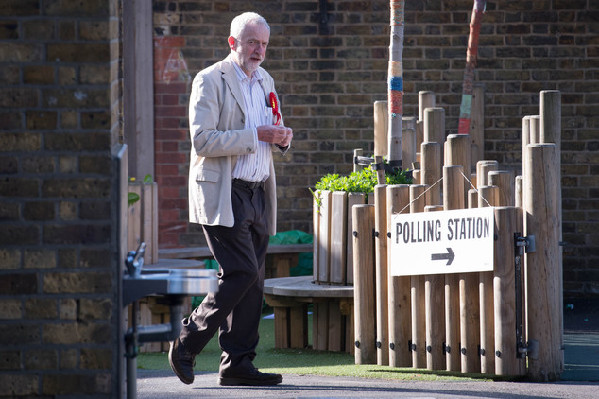British elections consolidate Corbyn's Labour leadership
- By Heiko Khoo
 0 Comment(s)
0 Comment(s) Print
Print E-mail China.org.cn, May 9, 2016
E-mail China.org.cn, May 9, 2016
|
|
|
Britain's Labour party leader Jeremy Corbyn arrives to cast his vote at a polling station in Islington, north London Thursday May 5, 2016. |
On May 5, elections were held in Britain for many local councils and city mayors, and for the Scottish, Welsh and Northern Irish assemblies. Before the vote, the biggest question was how will the Labour Party led by Jeremy Corbyn do?
Corbyn, a genuine socialist, was elected the leader of the party with 59 percent of the vote in September 2015. That result shocked the capitalist establishment and mass media, and it also horrified the overwhelming majority of Labour Party MPs, who lean toward the right of the party. As a result, we have witnessed an insipid campaign intended to undermine Corbyn's leadership.
For the last eight months, Corbyn had to fight on three fronts against the Conservative government, the mass media, and sabotage by his own MPs and parts of the party machine. This reached a pinnacle in recent weeks with a bizarre campaign to smear the left of the Labour Party as anti-Semitic. This focus stems from the split between the right and the left in the Labour Party about Israel. The right tend to be supporters of the state of Israel and the left tend to be supporters of the Palestinian cause. With the rise of Islamic fundamentalism, the right have reformulated their arguments, in defence of Israeli governments, around the fear of Islamic fundamentalism.
Many of the Labour right secretly hoped their own party would suffer a heavy electoral defeat on May 5, but the results confounded them. Not only did Labour's vote hold up in England and Wales, but Sadiq Khan, Labour's candidate for the Mayor of London,won a crushing victory over the Conservative Party candidate. Khan is the first Muslim Mayor of London, which is of symbolic significance, but he is on the right spectrum of the Labour Party. However, his victory was not because of Khan as a politician, about whom, people know little; rather, it should be understood as a huge popular endorsement by Londoners for Labour under Jeremy Corbyn.
Nevertheless, the results were not all rosy for Labour. The UK Independence Party (UKIP) faired quite well in these elections. Their main demand is to leave the European Union and a referendum on exiting Europe is to be held on June 23. The result is too close to call.
Another setback for Labour was in elections to the Scottish parliament. There, the Scottish Nationalist Party (SNP) won and support for the Conservative Party recovered. This pushed Scottish Labour into third place. Labour's demise in Scotland goes back to the way they have controlled politics there for decades. Many Labour Party officials and representatives in Scotland became lazy and corrupted by power, both morally and ideologically, and eagerly supported the wars in Iraq and Afghanistan, orchestrated by Tony Blair and George Bush. The Scottish Labour Party also presided over the privatization of public services and assets. These failures allowed the SNP to profile as a left wing, anti-austerity alternative. They presented Scottish independence as the means to rapidly move towards a more progressive society. In this way, the SNP stole the progressive cloak from Labour.
When the SNP lost the referendum on Independence in 2014, by 44.7 to 55.3 percent, people resented the negative scaremongering of the No campaign. As Labour sided against independence this also undermined its support. Consequently, the SNP emerged as a mass political party. Some of its representatives and most of its members support progressive ideas. The task of winning back Scottish voters to Labour is a big one. Above all, it requires a profile to the left of the SNP.
Last summer, the mass media and the Labour right wing declared that Jeremy Corbyn could not possibly win the Labour leadership election. When he won they declared he would bring electoral disaster to the Labour Party. On both scores they were completely wrong. It seems that the media and Corbyn's opponents in the party lack the means to understand the processes that actually shape political consciousness in society. They imagine that politics is about slick presentation, message spinning, personal appearance, parliamentary ritual and commercial branding. Actually, politics remains governed by class interests and the class struggle; Corbyn's leadership of the Labour Party represents the revival of the working class as the main political force seeking progressive change in Britain.
Heiko Khoo is a columnist with China.org.cn. For more information please visit:
http://www.china.org.cn/opinion/heikokhoo.htm
Opinion articles reflect the views of their authors, not necessarily those of China.org.cn.







Go to Forum >>0 Comment(s)